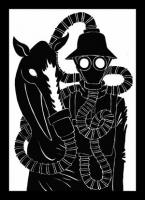0
















| Thumbs Up |
| Received: 8 Given: 22 |

Industrialization and Collectivization
At the end of the 1920s, a dramatic new phase in economic development began when Stalin decided to carry out a program of intensive socialist construction. To some extent, Stalin pressed economic development at this point as a political maneuver to eliminate rivals within the party. Because Bukharin and some other party members would not give up the gradualistic NEP in favor of radical development, Stalin branded them "right-wing deviationists" and during 1929 and 1930 used the party organization to remove them from influential positions. Yet Stalin's break with the NEP also revealed that his doctrine of building "socialism in one country" paralleled the line that Trotsky had originally supported early in the 1920s. Marxism supplied no basis for Stalin's model of a planned economy, although the centralized economic controls of the war communism years seemingly furnished a Leninist precedent. Between 1927 and 1929, the State Planning Committee (Gosudarstvennyy planovyy komitet--Gosplan) worked out the First Five-Year Plan (see Glossary) for intensive economic growth; Stalin began to implement this plan--his "revolution from above"--in 1928.
The First Five-Year Plan called for rapid industrialization of the economy, with particular emphasis on heavy industry. The economy was centralized: small-scale industry and services were nationalized, managers strove to fulfill Gosplan's output quotas, and the trade unions were converted into mechanisms for increasing worker productivity. But because Stalin insisted on unrealistic production targets, serious problems soon arose. With the greatest share of investment put into heavy industry, widespread shortages of consumer goods occurred, and inflation grew.
To satisfy the state's need for increased food supplies, the First Five-Year Plan called for the organization of the peasantry into collective units that the authorities could easily control. This collectivization program entailed compounding the peasants' lands and animals into collective farms (kolkhozy; sing., kolkhoz --see Glossary) and state farms (sovkhozy; sing., sovkhoz --see Glossary) and restricting the peasants' movement from these farms. The effect of this restructuring was to reintroduce a kind of serfdom into the countryside. Although the program was designed to affect all peasants, Stalin in particular sought to eliminate the wealthiest peasants, known as kulaks. Generally, kulaks were only marginally better off than other peasants, but the party claimed that the kulaks had ensnared the rest of the peasantry in capitalistic relationships. In any event, collectivization met widespread resistance not only from the kulaks but from poorer peasants as well, and a desperate struggle of the peasantry against the authorities ensued. Peasants slaughtered their cows and pigs rather than turn them over to the collective farms, with the result that livestock resources remained below the 1929 level for years afterward. The state in turn forcibly collectivized reluctant peasants and deported kulaks and active rebels to Siberia. Within the collective farms, the authorities in many instances exacted such high levels of procurement that starvation was widespread.
By 1932 Stalin realized that both the economy and society were under serious strain. Although industry failed to meet its production targets and agriculture actually lost ground in comparison with 1928 yields, Stalin declared that the First Five-Year Plan had successfully met its goals in four years. He then proceeded to set more realistic goals. Under the Second Five-Year Plan (1933-37), the state devoted attention to consumer goods, and the factories built under the first plan helped increase industrial output in general. The Third Five-Year Plan, begun in 1938, produced poorer results because of a sudden shift of emphasis to armaments production in response to the worsening international climate. In general, however, the Soviet economy had become industrialized by the end of the 1930s. Agriculture, which had been exploited to finance the industrialization drive, continued to show poor returns throughout the decade.
http://lcweb2.loc.gov/cgi-bin/query/...d(DOCID+ru0037)




| Thumbs Up |
| Received: 151 Given: 4 |

My family suffered from the so called collectivization - first they got all our lands (my grandfathers were rich and middle classed farmers), second the so called "democracy" returned not all(best parts were restricted to certain people). This politics caused the dead of our farming traditions.
Bad bolshevics "brought" that in other countries, as well...
“The truth is lived, not taught."Void aka DusanTabiti is just a paranoid Bulgarian who clearly has an agenda
There are currently 1 users browsing this thread. (0 members and 1 guests)
Bookmarks